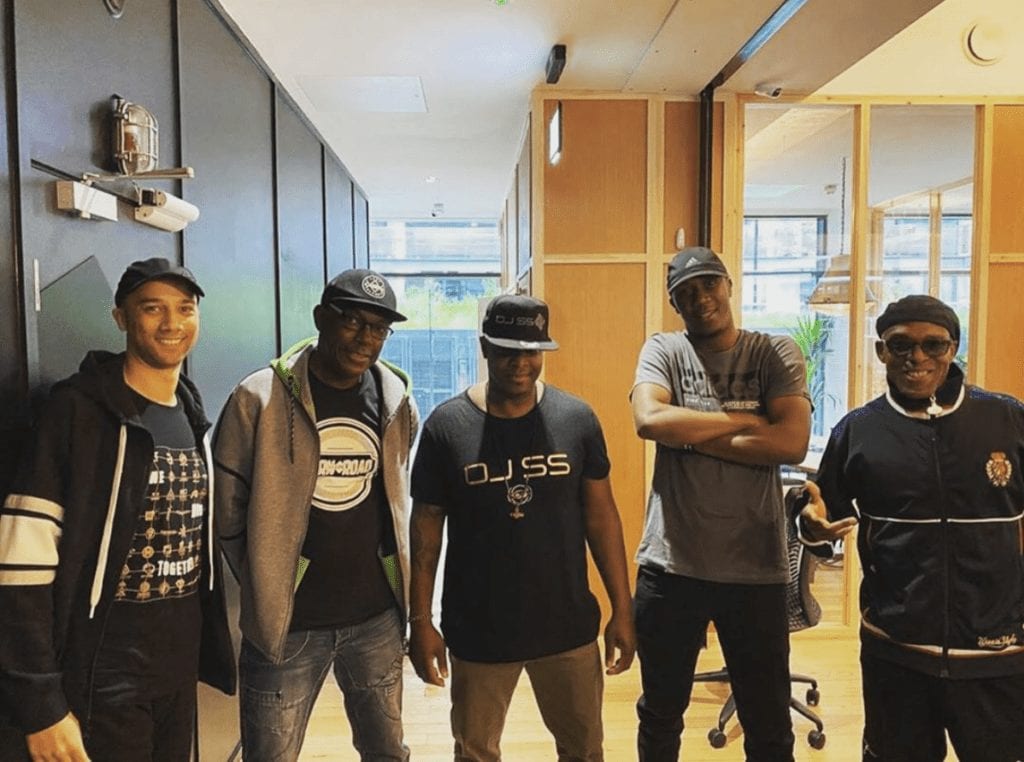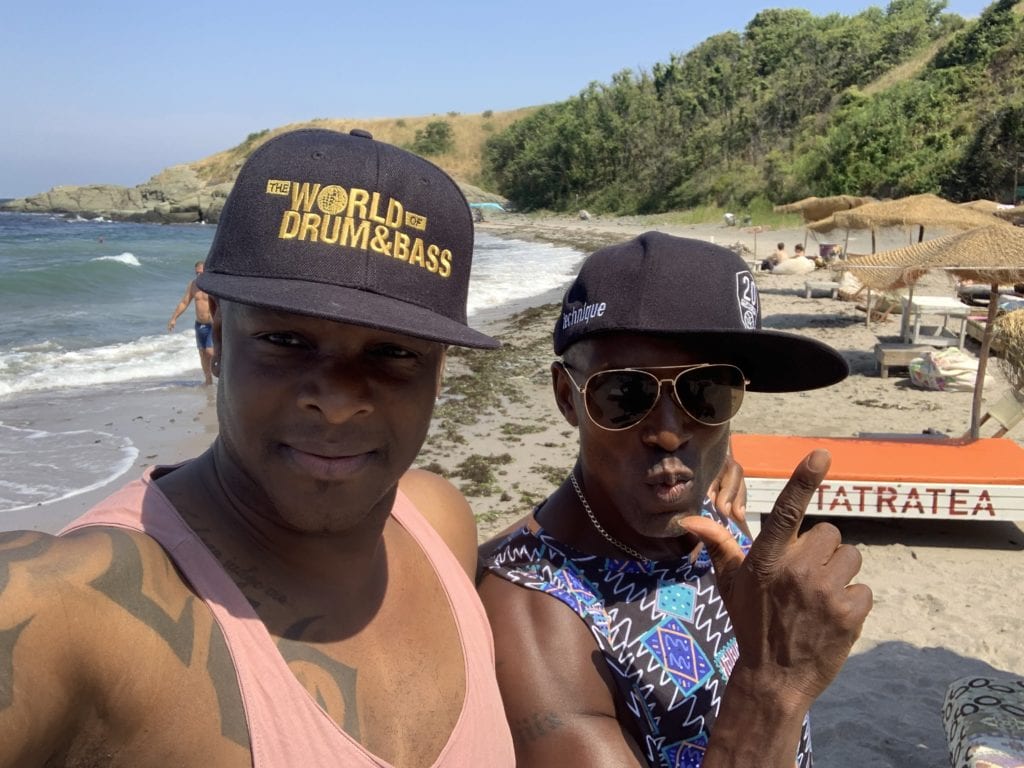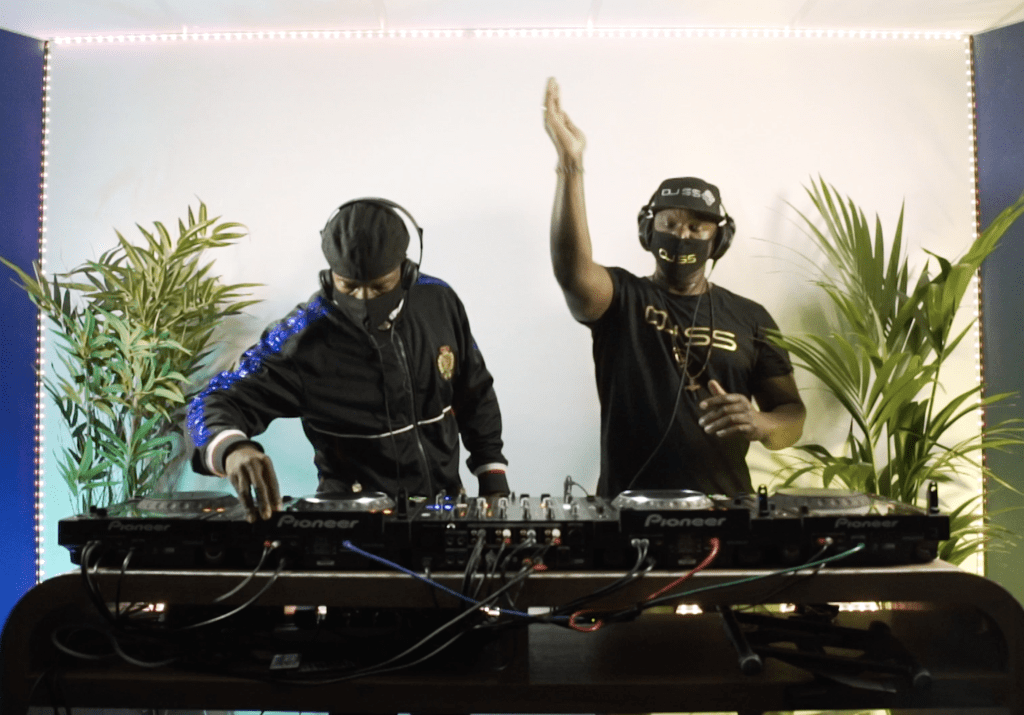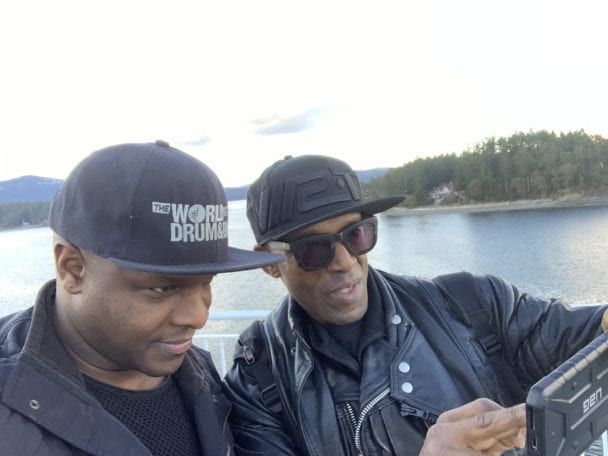This week we linked up with two of the longest standing pioneers and statesmen in the game to celebrate drum & bass jungle’s black music foundations: DJ SS and Simon Bassline Smith.
Marking the end of Black History Month, they curated a special live stream line-up to celebrate the music and culture’s black roots and future talent. Rolling deep with Kenny Ken, Bladerunner, Mistic and Spexion, the event was a celebration of everything that has brought us to this moment right now…

“The reason why I’ve put this together, is that I felt for years that I wanted to contribute to Black History Month as it’s part of our heritage and now seemed the right time,” explains Formation Records bossman SS. “The perfect way to celebrate this is make our audience aware of its existence and celebrate the input from our forefathers in music; reggae, soul, hip-hop… Jungle came from these we feel we have an obligation to continue this celebration within our music and educate.”
This music would not exist without blues parties or soundsystems creating spaces for the music to flourish and develop. This music would not sound like it does without soul, jazz, funk and reggae samples being used. And this music definitely wouldn’t have the unifying effect that creates such strong bonds between fans or loyalty from fans to the music without movements like hip-hop and jazz setting revolutionary agendas in terms of experimentalism, innovation and politics.
Drum & bass came from the deepest possible black roots and foundations, but was always meant to unite the people. Right now, as we near the end of one of the most frustrating years we’ve ever, a year in which things seem more divided and volatile than ever, we need to celebrate this. We called up Leroy SS and Simon Bassline Smith to look back over some of the most important aspects of drum & bass jungle history… And how we can move forward to a more unified and understanding future.
How have your lockdowns been?
DJ SS: It’s been good, I can’t lie. I’ve been in the studio, spent more time with the family. Our industry has suffered so much, if we can’t go out and work then lockdown makes no difference to me.
Bassline Smith: Same here, really. I’ve been in this game for such a long time, I’ve got used to the to’s and fro’s this industry can throw at me. There are waves and those waves are not always on the up. You become resilient. You’re able to withstand periods where you’re not as busy as you’ like to be.
Underground music has to be resilient. You don’t do this for a career – it’s a calling.
Bassline Smith: Definitely. When I started no one wanted to be a DJ. Everyone wanted to be a dancer. I was a terrible dancer so that was fine by me. But there was no idea that DJing would become this huge industry.
DJ SS: I used to come and listen to him to play back then and it was like ‘Yo! Where did this man get his tunes from?!’
Bassline Smith: He was 14. He was just a little lad, breakdancing. That’s how far we go back. That was like 1984 or something!

Where did you get your tunes from?
Bassline Smith: I was lucky to be influenced by older DJs who were around me. People like Colin Curtis and Devon Daley and Jonathon Woodliffe. He was an incredible DJ who worked in Arcade Records in Nottingham. He’d have this under the counter section and I’d go there every week. All records were imported. There was no UK scene. We were importing Chicago house music long before the rave scene. This was 85, 86 and Jonathan was importing records from Chicago, New York, Philadelphia, Detroit. House, funk, soul, hip-hop. And the crowds were we playing to were mainly black crowds in the all-dayer soul scene. That was a thriving scene through most of the 80s but started to dip around then and we realised the same records were being appreciated by a different type of scene – the rave scene. I was positioned really well to transition from almost entirely black non-alcohol drinking, dancing crowd to the crowds of messy ravers. It was the complete opposite; it was people from all colours and all creeds and most of them were fuelled by drugs. And from there we’ve gone through the many transitions. But Leroy and I came from those same roots.
They’re the very roots of the scene. You listed them: house, hip-hop, funk, soul, blues. Without those inspirations and those starting points, this music would not exist.
Bassline Smith: That’s right, and I think younger fans who’ve come into drum & bass more recently aren’t as aware of that. So it’s up to people in positions of power or influence to make sure people know those roots. When we were teenagers we’d research these things and do our digging. Now with technology it’s so much easier to find these things out but it’s also easier to remind people that this music would not exist without those roots and that many of us were playing it years before the rave scene even kicked off. We’re the teachers, we need to make people know how deep it goes. We’ve seen it grow, we’ve seen it come from the forefathers before us; the soundsystem guys, the reggae guys, the blues parties, the original hip-hop guys. Those are the guys who enabled us to do this.
DJ SS: Simon just reminded me about house parties! They were buzzing. There weren’t many places to hear this music so we’d go to house parties and it would be rammed. And it was just purely to hear the music. We’d put on these tiny little hip-hop events in church halls and go to places like the Afro-Caribbean Centre and places like that. It was actually a sports hall when I went to my first rave. It blew my mind; around 1500 people in there, going mental. I couldn’t fathom it at all. Then I saw known football hooligans hugging each other and I just lost my mind. It changed me overnight. Me and Idris were like ‘Wow this is what we need to do!’ That experience unified everyone and everyone wanted to socially express themselves. But now we’re back to square one. So where do we go from here?
Except there seems to be less unity and a lot more division…
Bassline Smith: So we’ve got the evolution. We went from all dayers and blues parties to the early rave scene and acid house. People started experimenting with breakbeats, with old soul samples, reggae samples, funk samples. We took bits from records we could relate to. That was the early melting pot. But it also came from white music – I sampled Led Zeppelin for the vocal on Palamino, for example. So the music was from everywhere. The crowds were from everywhere. The DJs were from everywhere. As time’s gone on over the years, and drum & bass has matured. It was very much a UK thing to begin with; a London thing, a Midlands thing, a Manchester thing, then it extended around the world. The melting pot expanded in one sense; but in another sense it wasn’t. You go to some places in Europe you may not see one black person. I get booked some places and I don’t see another black man from the moment I leave the UK until the moment I return. I remember my first booking in Russia, I was para! It was like ‘Yo, where am I?’ So we have very different audiences who relate to different things in the music.
On top of that, we also had people leaving the scene. A lot of people left to UKG for a while. Because what was happening in garage was much more relative and resonant with black people than the rockier and heavier sounds that were happening in drum & bass at the time. So you get these melting pots constantly moving around, bringing in people, taking people away. But beyond all that, the one thing about D&B is that it’s universal. It doesn’t matter what colour or creed you are, there’s something in the music that you will relate to. It’s still exactly how it was when we got into this. When you get in the dance you leave colour behind you and it’s unity. That’s why we love this scene isn’t it, Leroy?
DJ SS: Totally. I think the divide that I see the most is a class divide. Between the middle and the working class. But then you do see a picture being painted and images brands wanted to portray. From an aspiring artist point of view, you gravitate to the familiar. So, for a black artist making beats a few years ago, they look at UKF or they look at SBTV and who are they going to relate to more? Personally I’ve never looked at black and white. I’m from the north. When I listen to music I don’t say ‘Who made this?’ If it’s a banging tune then it’s a banging tune whether you’re black, white, green or alien. It’s never been about colour. But what’s happened now is that people have painted pictures and recently in Covid times it’s given people time to sit back and think ‘hang on, I’m not included in this’.
You had your documentary, then you had the Black Lives Matter movement which amplified that discussion again. It made me think about how I do business as well. I got a business in Russia, I chose to work in that country and I get love there, but I go to my own rave and I’m the only black guy on the line-up it made me think ‘Okay what am I doing to help this situation? Am I educating the Russians?’ I sat down with the promoters and we developed a whole new strategy and how we can be more diverse. If everyone sits down and thinks about what they can do, the picture that’s been painted over the last few years will be very different. So that’s why we’re celebrating Black History Month. For me it’s not about colour, it’s about celebrating black roots.
Bassline Smith: You’re right about it being a class thing. You get the student audience who are more geared and pushed towards one direction and then you get more your working class who relate to different parts of the music but at the end of the day we should be together. Especially now, people are on edge. It’s been a whirlwind. There have been a lot of catalysts – including your documentary – that have made people have to question what they’re doing, how they’re doing it and whether they’re bringing the music to, and engaging with, a truly diverse audience. Are you bringing people together? All these events in the last few months have made organisations who had a stereotype image of audience they wanted to attract blow the walls down of any boundaries and make sure they encouraging a diverse audience and encourage artists of backgrounds and colours.
Promoters need to do this too and make sure the line-ups represent diversity.
DJ SS: Yeah definitely. We all have a responsibility. Promotions, for a long time now, have been based around internet hype and social media numbers. People look at who’s ‘hot’? I’ve said this to my guys now: we’ve got to educate, don’t worry about how many likes people have got. There’s no way I’m going to be in one of my raves and be the only black DJ there anymore. It’s not about colour, it’s about diversity full stop. And the thing is, you get these big headliners who charge far too much that they stop any chance of diversity happening.
Instead of one massive headliner, you could have 10 amazing up and coming DJs from all kinds of backgrounds. The whole commercial ethos needs to change. How can you justify earning in one hour what regular people have to work two months for just for pushing some buttons? No, that’s wrong. So for me it’s about education. It’s about making people aware. That’s why we’re celebrating Black History Month. That’s why every label, every brand, every artist should be doing something about it.
Silence is pretty incriminating right now
DJ SS: Totally. It’s about making a difference. Right now we’re talking about black history, we also need to talk about venues and viability when the clubs reopen. We need to talk about female acts. The problem is that there’s no unity. It’s a lot of people who all do their thing, agree on most things and love the music. We need to pull together and support each other more. The more people we can get the sound to, the more unity we have and that’s what started this scene. We all have a voice, if we come together that voice is much louder than any of us as individuals. That was what the I Love Drum & Bass project was all about but sadly we didn’t have enough unity.
Bassline Smith: When you have a scene that’s global like drum & bass, you need all those parts to contribute. It’s all right all the DJs being pals but the labels, the editorial guys, the video guys, the channels, the promoters need to be inclusive and celebrate what makes this scene special and support each other.
DJ SS: World Of Drum & Bass came about through that. We made a statement at the Miami Music Conference all those years ago; we were all there together and went as big as we could. We took all our people, we flew over and we took over that venue and it was one of those incredible moments of unity. I wasn’t thinking business-wise, I wanted to put on a sick party that brought people together and that was the result. You have to have your heart in it and do it to push the music before you think about money.
It’s a bit like the streaming events we’ve had this year. For some it’s been the closest we can get to raving. It’s for the sound and this culture to continue full stop, not about paying bills. You guys looked like you were enjoying the stream for this one!
DJ SS: It was so nice to see everyone. It’s been a long minute, but the most important thing is the message: This is a celebration of all the music that brought us to this point, all the people who came before us, all people of colour in this scene. This is our heritage and we want to see this celebration grow. It’s not about black power or black lives matter, it’s a statement – people opened the door for us and we all have to keep that door wide open.
Bassline Smith: It’s about everyone we’ve sampled, The Winston Brothers and the Amen break, the soundsystems the roots; this is a moment to shine a light on everything that’s contributed to make the scene what it is today… And how we need to be moving into the future.

